Both Jaguarundi Curl and Torby are originated from United States. Both Jaguarundi Curl and Torby are having almost same weight. Both Jaguarundi Curl and Torby has almost same life span. Both Jaguarundi Curl and Torby has same litter size. Jaguarundi Curl requires Low Maintenance. But Torby requires Moderate Maintenance
Basic Information
undefined
United States
United States
Life Span:
15 - 20 Years
10 - 18 Years
Colors Available:
Tawny, silver, black markings
Patches of red, cream, grey
Coat:
Short and silky
Short- or long haired
Temperament:
Affectionate, Alert, Cheerful, Curious, Energetic, Friendly, Gentle, Independent, Intelligent, Lively, Loving, Loyal, Outgoing, Playful, Responsive, Social, Territorial
Affectionate, Alert, Cheerful, Curious, Energetic, Friendly, Gentle, Independent, Intelligent, Lively, Loving, Loyal, Outgoing, Playful, Quiet, Responsive, Social, Stubborn, Sweet, Territorial
Grooming:
Low Maintenance
Moderate Maintenance
New Owners Friendly:
Yes
Yes
History
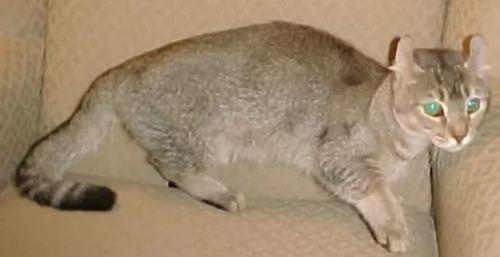 Found mostly in Central and South America, the Jaguarundi Curl has been bred to look like a wild cat. - the Jaguarundi.
Found mostly in Central and South America, the Jaguarundi Curl has been bred to look like a wild cat. - the Jaguarundi.
It was in the 1940s that the cat was also found in Florida. It is a result of a crossing between the Hyland Lynx with Munchkins and possibly other short-legged domestic cats.
The Munchkin cat is a medium-sized cat and it also has very short legs – the result of a genetic mutation.
The Torby is a rare cat and the name ‘Torbie’ is shortened for Tortoiseshell-tabby. They are known for their tri-colored coats. In fact, when a cat has tabby stripes along with Tortoiseshell markings, the results are Torbie.
Tortoiseshell cats are almost exclusively female. Males do exist but they are rare. They’re also referred to as Torties with their coat resembling that of the shell of a tortoise.
The colors represented are usually red, orange and black.
Just like the Tabby cat, the Tortie cat is not actually a breed, but is rather referring to the coat pattern. Pure breed cats such as the Maine Coon can also have a Tortoiseshell pattern.
Description
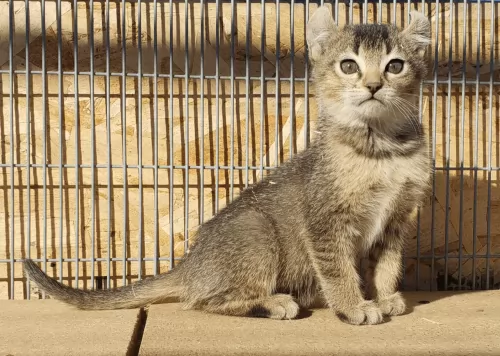 This is a medium-sized, strong, muscular wild cat with short legs, a large head and small ears that are curled and set wide apart.
This is a medium-sized, strong, muscular wild cat with short legs, a large head and small ears that are curled and set wide apart.
The eyes are wide-set and are large and expressive. The eyes can be gold, green or even blue.
The cat can weigh anything between 6 and 10kg. They can take up to years to reach their weight. The tail of the cat is long and thick, the body long and muscular.
The short coat is a ticked or a spotted pattern and can come in various colors. In most cats, the coats are tawny or solid like the Jaguarundi. In ideal specimens, coats will be tawny or solid like the Jaguarundi.
Temperament:
Maybe it’s the cat’s wild side but the Jaguarundi Curl cat is a shy, elusive and somewhat solitary cat. In the wild these cats only socialize to mate.
It is, however, a very vocal cat. The cat is also a good climber and swimmer and you will need to invest in climbing equipment.
If your Jaguarundi Curl has more Munchkin in him, you may find him far more sociable and actually seeking out the company of his human family.
There is a type of tortie cat that is called a torbie and it comes with tabby-like features. They are striking looking cats and can be medium to large size, weigh between 3 and 7kg and be muscular and athletic.
Essentially when there are tabby stripes you get a Torbie. Some people call them patched tabbies because they are a tabby with
Temperament:
No two Tortoiseshell cats have the same personalities, and because they can be any breed of cat, they have a wide range of personality characteristics.
They can be energetic, docile, curious, lazy, playful, shy, reserved, aloof, social, friendly, angry, calm, or something else. Not every Torbie cat will have the same characteristics, but most make the most awesome pets.
It is true that a cat’s personality and behavior are formed a lot by the people who own it and the lifestyle they provide for it.
Characteristics
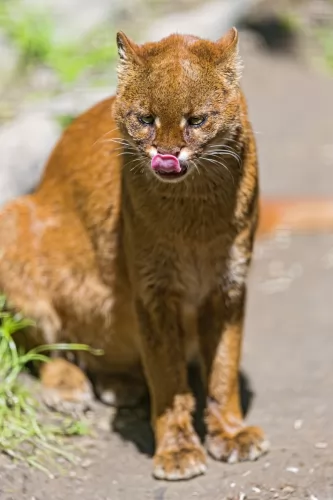 The wild Jaguarundi is smallish cat that is a little bit larger than a house cat.
The wild Jaguarundi is smallish cat that is a little bit larger than a house cat.
Some people like keeping these mixed-breed, hybrid cats, and they can make good pets, but they do tend to be reclusive. You have to remember that with these cats, part of their genetic makeup is a wild cat, and this just means that you can’t really be sure how they will turn out.
Think twice before you buy a cute little Jaguarunndi Curl kitten. Cat Rescue shelters are seeing a massive escalation in the number of hybrid cats who are just abandoned by their owners.
They wanted a ‘wild-type’ cat and ended up with behavior from the cat that they couldn’t handle. How cruel is that. Its the human's fault, not the cat.
Your torbie cat isn't going to turn out the same way as your friend's torbie cat. This is because torbie is just indicating the type of coat your cat has. Yes, they can be strong-willed, social and even angry sometimes, but they can also be quiet, sweet and content. Nothing is set in stone when it comes to a cat's personality.
The type of personality you have and the lifestyle you provide your cat with can play a big part in how your Torby turns out. Give him lots of love and care and you'll be blessed with an awesome friend and pet.
Health Problems
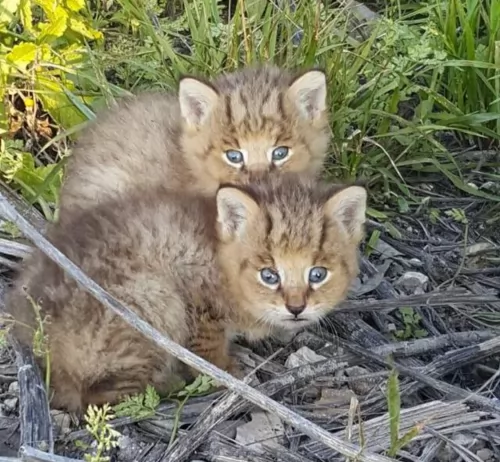 Hybrid cats do have some health issues because of their breeding. Cat owners who choose these cat breeds need to know that they have special needs.
Hybrid cats do have some health issues because of their breeding. Cat owners who choose these cat breeds need to know that they have special needs.
You should speak to your vet about the health of your cat. Domestic cats and wild cats have a different number of chromosomes. These cats wouldn’t normally mate so that when they are crossed during breeding, an abnormal genetic makeup is a result.
Reproductive problems in cats like the Jaguarundi Curl become a common occurrence and stillbirths can be the norm. Often you’ll find that some of the cats are infertile, whether male or female.
You've also got to be aware of vaccines as sometimes they don't work with these hybrid cats. Many times a cat like this is exposed to rabies and you'll find that the vaccine was ineffective.
Torbie cats are such lovable felines and because they are describing the type of coat the coat has and not the breed, nobody can be sure how long these cats will live for.
Some will only live to be 10 while others can reach 15 to 18 years of age. The diet and lifestyle you give your torbie can influence his health and longevity.
Health issues in a torbie are certainly not connected to the color of the coat. No matter what cat breed you have, most of the common cat illnesses to watch for are issues that affect the kidneys, the eyes, the skin, and heart.
Make sure you get your torbie vaccinated against some of the deadly cat diseases there are.
Caring The Pet
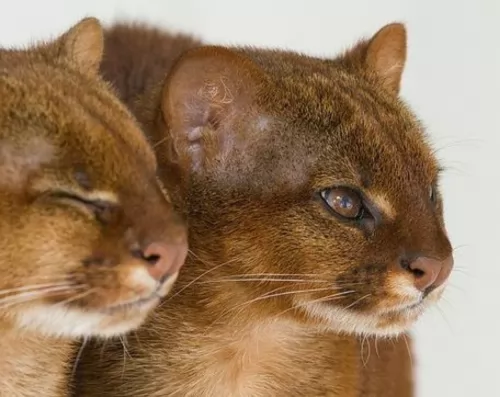 Be prepared for the new arrival of your cat. Have food and water bowls, warm bedding, toys, litter box, and food all available and waiting.
Be prepared for the new arrival of your cat. Have food and water bowls, warm bedding, toys, litter box, and food all available and waiting.
Your Jaguarundi Curl doesn’t require a specialized diet. You can feed him much the same as your other domestic cats.
The food needs to be high-quality and can be wet or dry food, so long as it makes sure that meat is the top ingredient. Your cat is a carnivore and will require meaty meals to remain healthy. Dietary supplements or vitamins can only do your Jaguarundi Curl good.
You can brush the coat once each week to remove loose hair and to keep the coat shiny.
You want to provide your cat with a litter box and keep it clean too. These hybrid cats don’t easily learn to use the litter box as they should, and they may do their business around your home as opposed to using the litter box.
Get your pet a collar and tag to identify your cat in case he gets away.
It can be difficult to decide which food to go with for your feline friend as the cat food manufacturers have provided pet lovers with a generous selection.
With a cat, it may be tempting to choose the cheapest option, but in the long run, it will just increase your vet bills. Diet plays a massive role in the health of your cat. The important thing to remember is that your cat is a carnivore and he will require meat as the biggest part of his diet. If in doubt, speak to your vet about the type of food to give your cat and how much.
Ensure your cat has a constant supply of fresh, cool water.
All cats are low-maintenance, and your Torby isn’t going to require much grooming. Make a habit of regular grooming, even if it is only once a week. Your Torby will also need his claws trimmed regularly. You can visit your vet or pet groomer to do this for you.
Just like human parents prepare for the arrival of a new baby, you have to prepare for the arrival of a cat in the home, whether it comes to you as a kitten or an adult.
Make a list of the essential cat accessories you will need.
Buy some fun toys for your Torby, more so if you are bringing a kitten home. Cats need to be stimulated to steer away from boredom.
Essentially your Torby checklist will look like this -
• Litter box and cat litter
• Cat bedding
• Veterinarian-recommended cat food
• Bowls for food and water
• Toys
• Collar with tag and contact info etched in
• Brush for grooming
• Scratching post
• Climbing tree
Comparison with other breeds
- Jaguarundi Curl vs Abyssinian - Breed Comparison
- Jaguarundi Curl vs Aegean - Breed Comparison
- Jaguarundi Curl vs African Serval - Breed Comparison
- Jaguarundi Curl vs Chausie - Breed Comparison
- Jaguarundi Curl vs American Bobtail - Breed Comparison
- Jaguarundi Curl vs American Curl - Breed Comparison
- Jaguarundi Curl vs American Keuda - Breed Comparison
- Jaguarundi Curl vs American Longhair - Breed Comparison
- Jaguarundi Curl vs American Polydactyl - Breed Comparison
- Jaguarundi Curl vs American Shorthair - Breed Comparison
- Jaguarundi Curl vs American Wirehair - Breed Comparison
- Jaguarundi Curl vs Applehead Siamese - Breed Comparison
- Jaguarundi Curl vs Ashera - Breed Comparison
- Jaguarundi Curl vs Asian - Breed Comparison
- Jaguarundi Curl vs Asian Semi-Longhair - Breed Comparison
- Jaguarundi Curl vs Australian Mist - Breed Comparison
- Jaguarundi Curl vs Balinese - Breed Comparison
- Jaguarundi Curl vs Bengal - Breed Comparison
- Jaguarundi Curl vs Bicolor - Breed Comparison
- Jaguarundi Curl vs Birman - Breed Comparison
- Jaguarundi Curl vs Blue Russian - Breed Comparison
- Jaguarundi Curl vs Bombay - Breed Comparison
- Jaguarundi Curl vs Brazilian Shorthair - Breed Comparison
- Jaguarundi Curl vs Bristol - Breed Comparison
- Jaguarundi Curl vs British Longhair - Breed Comparison
- Torby vs Abyssinian - Breed Comparison
- Torby vs Aegean - Breed Comparison
- Torby vs African Serval - Breed Comparison
- Torby vs Chausie - Breed Comparison
- Torby vs American Bobtail - Breed Comparison
- Torby vs American Curl - Breed Comparison
- Torby vs American Keuda - Breed Comparison
- Torby vs American Longhair - Breed Comparison
- Torby vs American Polydactyl - Breed Comparison
- Torby vs American Shorthair - Breed Comparison
- Torby vs American Wirehair - Breed Comparison
- Torby vs Applehead Siamese - Breed Comparison
- Torby vs Ashera - Breed Comparison
- Torby vs Asian - Breed Comparison
- Torby vs Asian Semi-Longhair - Breed Comparison
- Torby vs Australian Mist - Breed Comparison
- Torby vs Balinese - Breed Comparison
- Torby vs Bengal - Breed Comparison
- Torby vs Bicolor - Breed Comparison
- Torby vs Birman - Breed Comparison
- Torby vs Blue Russian - Breed Comparison
- Torby vs Bombay - Breed Comparison
- Torby vs Brazilian Shorthair - Breed Comparison
- Torby vs Bristol - Breed Comparison
- Torby vs British Longhair - Breed Comparison
 Petzlover
Petzlover Found mostly in Central and South America, the Jaguarundi Curl has been bred to look like a wild cat. - the Jaguarundi.
Found mostly in Central and South America, the Jaguarundi Curl has been bred to look like a wild cat. - the Jaguarundi. This is a medium-sized, strong, muscular wild cat with short legs, a large head and small ears that are curled and set wide apart.
This is a medium-sized, strong, muscular wild cat with short legs, a large head and small ears that are curled and set wide apart. The wild Jaguarundi is smallish cat that is a little bit larger than a house cat.
The wild Jaguarundi is smallish cat that is a little bit larger than a house cat. Hybrid cats do have some health issues because of their breeding. Cat owners who choose these cat breeds need to know that they have special needs.
Hybrid cats do have some health issues because of their breeding. Cat owners who choose these cat breeds need to know that they have special needs. Be prepared for the new arrival of your cat. Have food and water bowls, warm bedding, toys, litter box, and food all available and waiting.
Be prepared for the new arrival of your cat. Have food and water bowls, warm bedding, toys, litter box, and food all available and waiting.